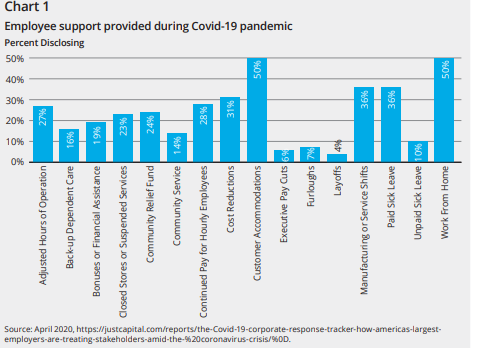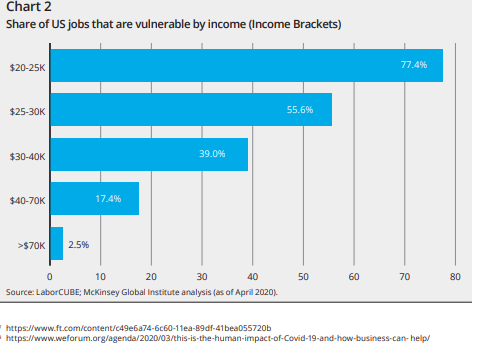
In part 2 of a 3 part article series assessing the impact of Covid, the team from Aberdeen Standard Investments touch on some of the social considerations and the importance of supply chain management.
Access to safe working environments
The lack of access to adequate healthcare and paid sick leave is surprisingly widespread. In the US for example, around 11% of the population does not have health insurance and before Congress recently took action, 25% of workers did not have paid sick leave.
The emergence of the ‘gig’ economy in particular has increased the number of vulnerable workers with little or no job security, time off, or sick pay. Many have therefore been forced to continue working through the Covid-19 crisis regardless of the potential negative health impacts. We regard this as a key risk for companies that are dependent on contractors, temporary or other ‘gig’ workers without normal worker protections.
Nonetheless, the pandemic creates the opportunity for employers and regulators to rethink employment benefits broader employment protection. ASI is walking the talk by rolling out strong engagement plans promoting workforce diversity and inclusion, living wages (where affordable) and embracing a culture of more flexible working.
A number of companies are responding positively by providing new support to workers, including more flexible working patterns and more extensive paid sick leave (see chart 1).

Job losses and staff redeployment
With industries under extreme financial pressure as a result of social distancing measures, many businesses are facing difficult labour management decisions. While job cuts and restructuring are unavoidable during difficult economic times, we encourage companies to retain as many people as is consistent with their near and long-term viability.
Even more importantly, broader employment rights also should be safeguarded. Some firms have unjustly terminated contracts, asked employees to take unpaid leave or accept pay freezes. Where layoffs are necessary, these should be conducted in accordance with applicable laws and must be transparent and non-discriminatory.
Inequalities and human rights
Amid the health and economic fallout from the Covid-19 pandemic socioeconomic classes are not being affected equally. The US Bureau of Labour Statistics found that half of university-educated workers are able to work from home, compared to just 13% of those with a high school diploma.
The skill distribution of different types of jobs is equally significant. Low -skilled delivery drivers, supermarket workers, and warehouse workers are classed as key workers. They are also more likely to be impacted by job losses (chart 2).

Likewise, the pandemic and lockdowns are not affecting the genders equally. The UN has highlighted that women are suffering more of the effects of the crisis. That is because they are more likely to be daily wage earners, small-business owners or work in informal sectors. As a result, women have a higher chance of being left in a precarious financial position.
While some of this is unavoidable, investors do have a role to play in making sure that the employment decisions and work practices of companies take their impact on vulnerable groups into account, mitigating the effects where possible.
Many marginalised communities are suffering due to loss of livelihood and lack of food, shelter, health, and other basic needs. Businesses can assist these underserved populations by helping them to access limited resources and of course avoiding any abuses themselves.
Supply chain management
Securing supply chains in a highly integrated global economy, many companies ability to produce goods and service their customers has been interrupted by disruptions to international supply chains. On the basis of our ESG investment research and company engagements, we are encouraged that in general, executive teams closely track their tier-1 suppliers.
However, many companies only have a surface-level understanding of where their supply chains are located, the associated risks, and how to address them. For example, the tech sector relies heavily on components produced in China, yet only 12% of tech companies demonstrate an effective supply chain management system1.
The supply chain disruption during the pandemic should push executives to improve their supply chain management. It should also be a focus point for our company engagements.
End

References
1 https://www.ft.com/content/46bb05a9-23b2-4958-888a-c3e614d75199
